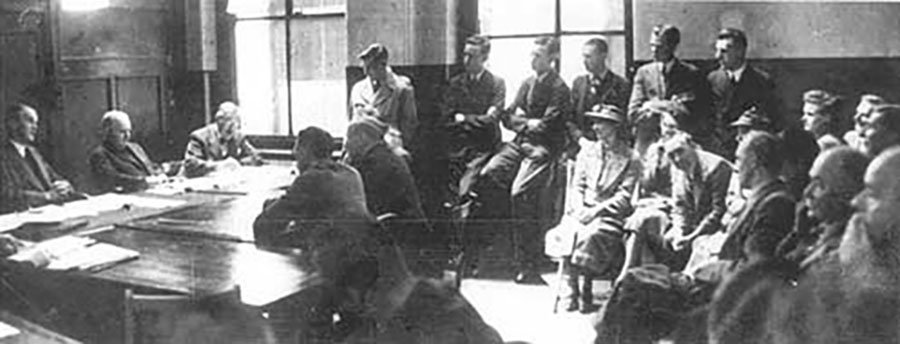
 |
 |
| World War 2 Tribunal |
Tribunals And it wasn't surprising that the tribunals often based their decisions almost entirely on personal reactions to the people who stood on trial - which is what it seemed like - before them. As one CO said, 'How can you prove you've got a conscience?' Student Cecil Davies' statement to his tribunal was, he said, 'very intellectual, though it was meant to be passionate, saying that the individual human being was the only holder of values such as beauty, truth, goodness, and to destroy human beings was to destroy those ultimate values too'. One of the tribunal members suggested alternative service. 'No,' said the chairman, 'If we give him that he'll refuse' - and gave Cecil unconditional exemption. A London man, Ken Shaw, told his tribunal that 'war was so obviously wrong and foolish and self-destructive that no sensible person could support it': his case was thrown out. Ken Shaw's view was that 'it should have been the people who were fighting the war who were explaining their attitude to me', not the other way round. 'But once war starts rationality and rational behaviour go out of the window.' Some of the COs must have genuinely baffled their tribunals. More than one man, discovering that being a Quaker often meant full exemption, told tribunals they didn't want to be judged by their religious views. Their listeners couldn't grasp that this was a way of expressing solidarity with people of other religions, or none, who weren't being exempted. Another CO asked to be assigned to the Friends Ambulance Unit, and was indignant when he was ordered to continue his comfortable scientific work: 'I can't do that. While I'm there my friends are dying.' Others like him actually gave up their 'reserved' jobs to continue the struggle for full exemption, whatever punishment they faced, in support of the CO cause. Equally, some of the tribunals left applicants speechless. An architect CO was asked 'Do you think building a bridge is more important than mending a man's arm?' One tribunal member demanded that each applicant must name all twelve of Jesus' followers, the apostles, and questioned the sincerity of the case if he couldn't do it. Another exclaimed, 'Even God isn't a pacifist - he kills us all in the end.' Just as in the First World War applicants were caught by the repeated question 'What would you do if an enemy soldier tried to rape your sister?', so this time around the catch question was: 'Is your objection to the taking of a human life?' (The sincerity of this basic objection was tested by such questions as 'If you object to taking life, why aren't you vegetarian?') If, explained one CO who faced this dilemma, 'they could pin you down to that, they could bring you into the military machine for non-combatant duties: you didn't take lives there. But I objected to being part of the whole process that led to killing. It was as though you were shown to be objecting to the unpleasant part of war and opting for the easier parts. I failed to get the tribunal to understand what my real point of view was.' | continue |
World War Two - Britain - INDEX |
| menwhosaidno.org | |